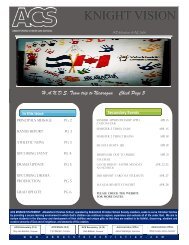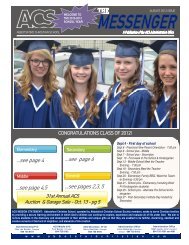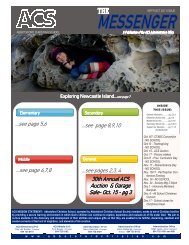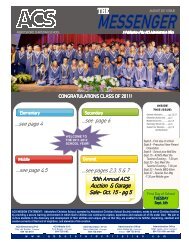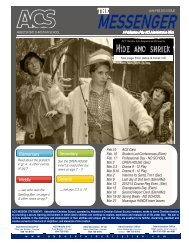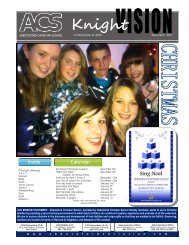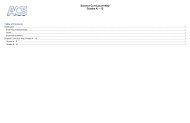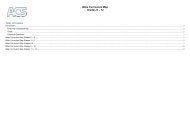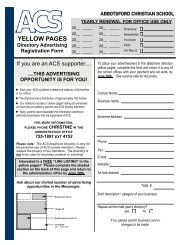Kindergarten Handbook - Abbotsford Christian School
Kindergarten Handbook - Abbotsford Christian School
Kindergarten Handbook - Abbotsford Christian School
You also want an ePaper? Increase the reach of your titles
YUMPU automatically turns print PDFs into web optimized ePapers that Google loves.
<strong>Kindergarten</strong>Parent InformationBookletABBOTSFORD CHRISTIANELEMENTARY SCHOOLRoy van Eerden - Principal3939 Old Clayburn Road<strong>Abbotsford</strong>, B.C. V3G 1J9(604) 755-1891; Fax (604)850-7075
Dear Parents:The purpose of this <strong>Kindergarten</strong> Parent Information Booklet is to explain theuniqueness of the <strong>Kindergarten</strong> program at <strong>Abbotsford</strong> <strong>Christian</strong> <strong>School</strong>.We recognise that our school is an educational extension of the <strong>Christian</strong> home, soif it is your desire to have your child in our <strong>Kindergarten</strong> class in September aunique partnership between us will be formed. If we have the privilege ofwelcoming your child to our school this fall, we do so with the pledge to helpeducate your child towards the development of a <strong>Christian</strong> commitment andlifestyle.It is our hope that your child's entry into our <strong>Kindergarten</strong> program will be anexciting and happy one. Your child will be entering a new part of his/her life. Aswith all things, the more prepared your child is, the more enjoyable your child willfind it. There are specific things parents want to know and this booklet waswritten to answer your questions.During the coming school year you will undoubtedly have many questions regardingour <strong>Kindergarten</strong> program and your five year old that this booklet does not answer.Please feel free to contact your child's <strong>Kindergarten</strong> teacher, or principal at anytime.Principal<strong>Abbotsford</strong> <strong>Christian</strong> ElementaryParts of this booklet have been gleaned from the Society of <strong>Christian</strong><strong>School</strong>s Loving, Living and Learning – Parent Orientation Booklet.We thank SCSBC for their permission to reprint this material.<strong>Kindergarten</strong> Parent Information Booklet, page 2
THIS PRECIOUS CHILDDear TeacherToday I feel like Hannah…I left my little girl, my firstborn, in your care.She is so excited, yet fearful;she is brave, yet so vulnerable;she has many lessons to learn – the hard way.These past five years, she has caused me to befrustrated,angry,joyful,awed, andamazed,so I shall not be surprised when you havethese very same feelings.I will pray for you…and understand.But take my precious girl and♥ be gentle, yet firm;♥ be understanding of her failures, yet help her to learn fromthem;♥ love her as she is, but challenge her to be what she ought tobe.And, above all, point her to the Saviour.Joyce EggebeenFor, after all, she belongs to none of us…this precious child isGod’s child.Her loving mother<strong>Kindergarten</strong> Parent Information Booklet, page 4
Exploring God’s WorldMs. Kovacs begins her <strong>Kindergarten</strong> year with teaching a unit aboutcreation. On one wall she outlines a large circle divided into four equalparts. She labels the four parts things, plants, animals and people. Shediscusses these four “realms” with her students and asks them to drawpictures for each category. She helps the students paste their pictures inthe right quadrants.Ms. Kovacs also has a picture of a huge hand above the circle. “Who looksafter our world?”, she asks. She elicits from the students that Godcreated and sustains the world, and that God’s hand is in control. Shestresses that God made people special. They form a separate realm andare not just part of the animal realm. God gave them a special task to carefor the earth and to praise God. The pupils trace their own hands, cut outthe shapes and paste them between the people “quadrant” and God’s handto symbolize that God has given them, too, a special calling.Then Ms. Kovacs asks her pupils how we can praise God (singing, go tochurch, pray to God, love others). How can we care for the earth? (lookafter animals and plants, don’t waste food). She explores how God hasgiven us a beautiful creation but that often people mess it up. She thenasks the students how they can serve God and neighbor inside theclassroom (clean up, obey the teacher, be kind to others). In this way,Ms. Kovacs helps students realize, young as they are, that they canalready take up their calling as disciples of Christ in a responsible andresponsive way—and thus participate in God’s Kingdom.H. VanBrummelen, 1998. Walking with Godin the Classroom, 2 nd ed., page 10.Reprinted with permission<strong>Kindergarten</strong> Parent Information Booklet, page 5
A. GOALS OF THE CHRISTIAN KINDERGARTEN<strong>Kindergarten</strong> in a <strong>Christian</strong> school Builds on a child’s knowledge of God Guides children to reflect God’s love to others around them Excites children about new knowledge of God’s world and helps themlearn and experience new ideas and skills Helps children to develop as responsible and responsive disciples ofJesus Christ Makes children aware of their task in caring for God’s creationB. A CHILD OF KINDERGARTEN AGEEach child is created by God as a unique individual with different abilities,tendencies and experiences. <strong>Kindergarten</strong> contributes to the growth of a child’sknowledge of themselves as children of God and adds to their understanding of theworld around them, a world created and sustained by God. In a stimulating, secureand responsive <strong>Kindergarten</strong> environment the child can experience the joy ofdiscovery in learning as well as receive encouragement to develop their gifts andtalents.The social, emotional, physical, intellectual and spiritual development of one childwill not be the same for all children in a <strong>Kindergarten</strong> class. Development variesfrom the latter stages of those seen in an average four-year-old to that of a sixyear-old.Within one <strong>Kindergarten</strong> class, it is possible to have an age span of elevenmonths from the youngest to the oldest, a significant difference considering thisis one-sixth of the child’s life span at this stage. Therefore, we cannot expect allchildren to perform at the same level. These two illustrations reveal some of thisdifference:SeptemberMay<strong>Kindergarten</strong> Parent Information Booklet, page 6
General CharacteristicsEach child has different abilities, tendencies, and experiences; each child iscreated by God as a unique individual. A <strong>Kindergarten</strong> classroom encouragesdevelopment of all their gifts and talents. The following examples are generalcharacteristics of children at this age. Not all children exhibit all of thesecharacteristics, but all children will exhibit many of them.Kindergartners need to move around frequently. They must learn how to usespaces, especially large open spaces like gymnasiums or hallways. They need achange of position and a change of scene often.Kindergartners need to talk. They must learn when it is appropriate to talk. Theyneed outlets for verbal as well as physical energy.Kindergartners need to listen. Besides informal occasions when listening isimportant, teachers design activities to specifically teach listening skills.Many kindergartners are shy. Some are shy only in certain situations. They mayneed time to adjust to their new setting.Many kindergartners are outgoing and uninhibited. They may need time to adjustto group dynamics.Kindergartners are egocentric. They view the world only from their ownperspective, based on their own experiences and what and how they think aboutthese experiences. They need a wide variety of familiar encounters, leading to theunfamiliar to learn about other people and how others feel about them.Kindergartners are often selfish and very possessive of their own things. Theyneed to be encouraged to share and take turns. Praise them when they do.Kindergartners want to feel proud, successful, and important. The<strong>Kindergarten</strong> room contains materials to help each child find success. Childrenneed some success each day in order to develop a good sense of who they are.Kindergartners have vivid imaginations. They may have trouble distinguishingbetween reality and fantasy.<strong>Kindergarten</strong> Parent Information Booklet, page 7
Developmental Dimensions of a Five-year-oldSpiritual and Moral begins to comprehend God’s unconditional love for himself and reciprocatesthat love can understand that God wants her to love others appreciates God’s wisdom in creating all that is in the world sees Jesus as a friend can praise God through prayer, song and listening to Bible stories can see himself as a disciple – a helper of God who can share his knowledgeof God with others is able to see her role or task in taking care of God’s world if it is related toher personal experiences sees stealing, lying, swearing, hurting others as wrong.Emotional still displays intense emotions likes to feel secure is pleasant and helpful and naturally happy continues to have strong ties with home begins to be able to control tears develops self-concept, wants to feel good about himself displays a sense of humour hesitates at new experiences that are completely unknown or are conceivedas too difficult can be shy or extremely aggressive looks for adult attention and approval dislikes being withdrawn from the group or “left out”Social enjoys approval and praise likes playing with others or in a group needs guidance about sharing and taking turns moves from being unable to see the needs of others towards cooperativeplay and recognition of rules and firmness values friendship and loyalty and can sympathize with others needs guidance in listening in a group situation follows the crowd without thinking.<strong>Kindergarten</strong> Parent Information Booklet, page 9
Intellectual and Aesthetic learns by doing, experimenting, manipulating, handling, exploring, imitating,observing – concrete experience sees similarities and differences and gross common attributes as opposed tomore subtle ones arranges sequence according to size and can extend if asked classifies, sorts and matches if guidelines are given lacks concepts of conservation, volume, large numbers, length follows simple directions up to three at a time has a limited idea of time and forgets easily is curious about his world and eager to experience new things is imaginative and learning to tell the difference between real and makebelieve begins to solve problems in real situations she comes in contact with cooperates and compromises to come to appropriate solution interprets and infers from pictures if encouraged is beginning to draw realisticallyPhysical is very active, full of energy but tires easily is better developed in the area of large muscles than small has difficulty with eye-hand coordination or small motor activities is susceptible to childhood diseases, colds, sore throats, ear infections displays some faulty or immature speech sounds including r, l, s, z, sh, ch, j,f, v, and th has short attention span has difficulty sitting still for long periods is able to run, jump, hop, roll, twist, but is still developing balance, skipping,bouncing and catching, hitting an object learns about his “own space” in relationship to the world around him has difficulty perceiving imaginary shapes, lines, corners, etc.<strong>Kindergarten</strong> Parent Information Booklet, page 10
C. PARENTS AS PARTNERSIs Your Child Ready for <strong>Kindergarten</strong>?Readiness for <strong>Kindergarten</strong> depends more on development than age, and there is awide range of abilities among children who are five. If your child does not have allthe skills or abilities of others his age, it may indicate that his developmental ageis younger and he may need more time before he can master those skills. Childrenwho turn five after September may fall in this category.How can you tell if your child is ready? You know your child best. Take a look at thematerial below and see if it supports your opinion. You can also obtain valuableinformation from preschool teachers (if he/she attended) and your child’s teacherto-be.If you are at all concerned about your child’s readiness for <strong>Kindergarten</strong>,discuss some of the following readiness questions with the teacher. Remember that<strong>Kindergarten</strong> will provide valuable structured learning experiences even for thoseless developmentally mature although a second year may be needed beforedevelopment and skill mastery are achieved.General Readiness ChecklistHas your child –1. had his vision checked?2. had her hearing checked?3. had his immunizations?Is your child –1. aware of dangers such as electricity, traffic and fires?2. able to express himself in complete sentences?3. able to cope with new situations?4. able to remember a song or nursery rhyme?5. able to dress him/herself?6. able to toilet independently?7. able to name colours?8. able to count?9. able to follow instructions?<strong>Kindergarten</strong> Parent Information Booklet, page 11
How will your child respond to –1. sitting still and listening while the teacher reads a story that takes morethan 5 minutes?2. learning routines at school?3. separating reasonably from parents on school days?Has your child had an opportunity to –1. make some of his/her own choices?2. have experience with crayons, pencils and scissors?3. be regularly responsible for some tasks at home? (Counting out the forksand spoons for setting the table)4. spend time away from home without mom or dad?5. have group experiences? What was the experience like?6. play with a variety of children?What Can Parents Do at Home to Help Children Learn? Talk with children. Ask them questions. Children learn to think by tryingto formulate answers. Listen to them and encourage them to listen whenpeople speak. This is a vital skill for learning. Read with your child. Reading with your child is important because itcontributes to vocabulary and oral language development. Help them to be independent in dressing, toiletry, tying shoelaces, cleaningup after themselves and caring for their own possessions. Try to maintain regular sleeping habits. Ten to twelve hours of sleep areneeded. Lack of sleep interferes with their school progress the next day bymaking them easily irritated and upset. Send children off on a positive note as this often makes a differencebetween a happy or unhappy school day. Remind them how they will be getting home from school. Encourage them to be considerate of others and to develop respect foradults and authority. If they see you support the teacher and the school,they will too. Be consistent. Follow up what you asked children to do; if they have not doneit, insist. Do not threaten with anything you cannot carry out. Carry out yourthreat if the task is not done. Limit television watching.<strong>Kindergarten</strong> Parent Information Booklet, page 12
What Can Parents Do as Volunteers in the Classroom? Your teacher counts on you, so try to be present at the time agreed on. Ifpossible, find a replacement when you cannot avoid missing your turn. Notifythe teacher as soon as possible if unable to attend. Arrive early so that you can discuss the day’s agenda and tasks planned foryou with the teacher. Encourage your child to sit as he/she does when you are not there.Independence is encouraged. (e.g. not on your lap). Guide individual behaviour at the teacher’s request. Participate in activities. Do not be afraid to ask the teacher questions about procedures,expectations, etc. Do not discuss individual performances of the children or the teacheroutside the school. Confidentiality is very important.How Can Parents Communicate Well with Teachers? Make your first contact a positive one. Understand clearly the teacher’s expectations. Accept your own responsibility for your child’s education. Become involved in your child’s educational experiences. Talk with the teacher first about a problem. Set up a conferenceTeachers hope that parents will . . .be involved in their children's education. Parentinvolvement helps students learn, improves schoolclimate, and makes teachers’ work more meaningful.<strong>Kindergarten</strong> Parent Information Booklet, page 13
D. CURRICULUMIntroductionThematic units form the basis of a <strong>Kindergarten</strong> curriculum. The program isorganized around activity centers carefully planned with materials and suppliesthat will foster the development of each child at their own rate.Activity centers are flexible and adaptable to the different themes(weekly/monthly units) around which the program is presented. Themes arecarefully chosen from one of the four realms: humans, animals, plants and physicalthings. Just as creation is a unity and interrelated, the theme will attempt to showthe relatedness of all things in God's world including learning.eg: God mademe specialHUMANSANIMALSeg. honeybees, petseg. water allaroundPHYSICALTHINGSPLANTSeg. apples,seedsMany of the following skills are uniquely integrated within the units taught.Bible (includes singing, prayer, devotions, Bible stories and memory work)Many children are already familiar with a number of Bible stories. In <strong>Kindergarten</strong>,they will continue to enjoy these but will be led to see them in a chronologicalorder as related to before and after Jesus was born.Language DevelopmentGod blessed His people with the gift of language to communicate with one anotherand with Him for His glory.A child begins to learn to read from the first time a parent introduces books andstories to them as a young child. Reading books to children is crucial for<strong>Kindergarten</strong> Parent Information Booklet, page 14
developing their reading and writing skills and creates a special bond betweenfamily members.Emergent Reading can be developed at home and at school as the child isencouraged to enjoy and appreciate a realm of books through experiencing whatlanguage and books are all about:• the appearance of the cover and title.• the feel of the paper, the turning of the pages.• the beauty and clarity of the illustrations.• the sound and rhythm of the words, the excitement and expectancy of whatmight happen next.• learning the names and sounds of the alphabet letters.• what is a word, sentence, etc.Children are exposed to a variety of experiences and opportunities for languagedevelopment. These take place throughout the day:• at library time. (Take your children to the public library on a regular basis!)• at sharing time.• in class discussions.• through memorizing and reciting.• when using and recognizing rhyming words and opposites.• when trying to make themselves be understood.• through expressing conceptual understanding of the world around them .• through listening activities.• by classifying, sorting, matching shapes and symbols.• by recognizing and making patterns, etc.• by experimenting with writing words and sentences (<strong>Kindergarten</strong> spelling).• through environmental print such as words on the wall, labels on groceryitems, and road signs.• through creating classroom big books and stories, matching print.PrintingPrinting is introduced in <strong>Kindergarten</strong>. Because most five year olds do not havesmall muscle control fully developed, an abundance of activities are provided tohelp the child:• develop the small muscles of wrists, hands and fingers.• to use his eyes to pick out fine details.<strong>Kindergarten</strong> Parent Information Booklet, page 15
• to coordinate movement of his hand and eyes as he follows the teacher, e.g.in directed drawing and observes the left to right progression of print.If children want to print their name teach them to use upper case and small caseletters, eg. Elise.Picture ReadingPicture literacy – being able to comprehend through visual clues – is an importantpart of learning to read. The parent and the teacher can develop the many prereadingskills of comprehension through picture reading long before the decodingof words takes place.Have your child look at a single picture or group of pictures and ask:• What is happening?• Show me…• Tell me…• Where is…• Who is this…• How many…can you see?• What do you think happened before or after?• Why do you think…• Pretend that…• How do you think it happened?There is a higher order of thinking happening here as with questions that developthoughtful and appreciative understanding such as:• What do you like about…• What don’t you like about…• Do you think that should have…• How would you feel if…• Have you ever…• What would you do if…This can be a lot of fun and you’ll be surprised how you little five-year-old’s mindworks. You’ll also be teaching one of the most important skills of learning to read.Mathematicsa. Patterning is one of the most important skills for Math and critical thinkingskills<strong>Kindergarten</strong> Parent Information Booklet, page 16
• line up car, truck, car, truck (AB pattern)• boy, boy, girl, boy, boy, girl (AAB pattern) etc.b. Number concepts. Experiences leading to the formation of number conceptstake place not only at school, but also in the home:“I have 6 candies, 3 for you and 3 for me.”“Count how many children are here today.”Let’s make some cookies. We’ll need 3 eggs. You can measure out 1 cup ofwater.”Before the child can make sense of abstract symbols, they must experience mathconcretely.c. Counting (one to one correspondence)• one count to each object• count a lot with your children. Some children are able to count well over100 at this aged. Matching and sorting is a basic thinking skill• Is this picture the same as the other? How are they the same? How arethey different?• Sort all the soft things into the green box and the hard things into thebrown box.e. Problem solving skills will develop as children sort for likenesses anddifferences and express the thinking that went into their choices.f. Graphing is a useful recording device frequently used in problem solving as ameans of organizing information:• Everyone who rides the bus stand here. Everyone who comes by car standhere. See, more people ride the bus than a car.g. Shapes (circle, square, triangle, rectangle, oval etc.)Social StudiesYoung children learn about the world by adding and relating to the experiencesthey already have. They are still basically egocentric. The program provides socialstudies units (e.g. God Made Me Special) that deal with children as they arecreated by God. They are led to see themselves as someone special made by God.God has placed them in the world with the task to look after the world and its<strong>Kindergarten</strong> Parent Information Booklet, page 17
people. It is important to know that a <strong>Christian</strong> <strong>Kindergarten</strong> is radically differentin its approach. God made children special not to become proud and self-centeredbut to use this specialty to serve others. A trip to a nursing home to delight ourseniors would be an example of carrying out our task in serving others.Children also need to be exposed to cultures that are different than their own (e.g.Japan). This is a marvelous way to open up their world towards justice, equality anda knowledge that all people are created for His glory. The children will be led topraise God for His wisdom and be encouraged to give glory and thanks to God.ScienceConcepts about natural and physical science as God has created the world, areformed as young children see, hear, touch, feel, smell, taste, question, and do.• They see the snow melt as the temperature changes.• They hear the mother bird calling to her young.• They watch their seeds grow when watered, or die when they’re not.• They note the changes in the tadpoles in the aquarium.• They smell the yeast as they make buns and they watch its effect asthey see the dough rise.• They feel the coldness of metal, the warmth of the pavement.• They taste the sour lemon, the sweet candy, the salty chips.• They pile the sand to make a dam.• They try to make a rock float, and they ask, WHY? WHY NOT?!MusicGod created children with innate need for music and rhythm. Music brings joy tothe children through listening and participating. Children need:• many songs to sing – using our bodies to sign and/or do actions relating tothe songs.• instruments to play• music to hear• patterns to clap• space in which to respond to music with their bodies<strong>Kindergarten</strong> Parent Information Booklet, page 18
Arts and Crafts ActivitiesGod’s children have wonderful gifts of creativity that are explored in arts andcraft activities:• imagine and visualize• develop sensory awareness• explore• create• interpret• express and represent through a variety of formsVarious media (paint, crayons, chalk, pastels, play dough, plasticine, scissors, glue,etc.) help them to express themselves creatively.Physical EducationGod commands us to look after our bodies (I Cor. 6:19 & 20). Physical education in<strong>Kindergarten</strong> includes large muscle and health fitness activities including games.Young children naturally like to move. They enjoy PE without realizing that theirloco-motor skills such as walking, leaping, sliding, galloping, hopping, skipping,rolling, dodging, falling are developing. Through various body awareness activities,creative movement and gymnastics, they'll get to know how their bodies move whenbending, stretching, turning, twisting, pushing, pulling, lifting, swinging, circling.They'll learn to be creative as they walk like a bear, slither like a snake and hoplike a rabbit.Personal DevelopmentSocial and Emotional Goals<strong>School</strong> has to be a safe and secure place for learning to happen. If our studentslearn and use the skills of Biblical love and respect in the classroom, theenvironment will foster growth:• respect for authority• respect for peers. Listening when others speak and speaking appropriatelyto others• Respect for others. Hurt no one physically or emotionally. Be kind andhelpful• Accepting responsibility for and the consequences of our own behaviour• Express emotions in an acceptable manner<strong>Kindergarten</strong> Parent Information Booklet, page 19
Work Habit Goals• Respect, care for and clean up classroom materials• Care for personal belongings• Follow class routines• Follow directions given to the class• Pay attention for a reasonable time• Complete simple tasks independently• Willingness to try new things. Participate in whole-class activities• Show independence during centre/activity time.<strong>Kindergarten</strong> Parent Information Booklet, page 20
E. SPECIFIC INFORMATION ABOUT OURKINDERGARTENOur school offers full and half time programs within which the same outcomes aretaught. In our full time program students have more class time to develop theskills necessary to meet the desired outcomes. In the half-time program, studentsparticipate in all the same activities, but also have more time at home and in otherplaces to grow and develop. The half-time program runs two full days per week(Tuesdays & Thursdays or Wednesdays & Fridays) with an occasional third day on aMonday. A class schedule will be given to parents at the beginning of each month.Parent Volunteers:There will be an opportunity for parents to assist in the <strong>Kindergarten</strong> room. This isan opportunity to see your child in the school setting. Your visit will be scheduledat a convenient time. There will also be other volunteering jobs available. Thesecan be discussed during the classroom visits. If possible, please find a babysitterfor preschoolers when it is your turn to volunteer in the classroom. Preschoolerscan be distracting for Kindergartners.Classroom Visits:Each <strong>Kindergarten</strong> student will have an opportunity to visit the <strong>Kindergarten</strong>classroom with one or both of their parents prior to their first day of school inSeptember.During the classroom visit, the <strong>Kindergarten</strong> teacher will:1. meet the new student and introduce them to the classroom environment2. establish relationship with the parents/guardians and outline expectationsregarding parental involvement in the <strong>Kindergarten</strong> program.3. review the <strong>Kindergarten</strong> program and items in the <strong>Kindergarten</strong> ParentInformation Booklet if there are questions4. conduct initial observation/assessment of new students5. provide parents with a schedule of <strong>Kindergarten</strong> days for September.Classroom visits will be scheduled by the <strong>Kindergarten</strong> teacher for the last weekof August and the first week of September.<strong>Kindergarten</strong> students will start school a week after regular (grade 1-5) schoolclasses begin.<strong>Kindergarten</strong> Parent Information Booklet, page 21
Assessment:During the first months teachers will assess your child so that we can plan theprogram to best suit his/her needs. There will be a Parent Teacher conference inthe Fall, student led conferences, and report cards in December, March and June.Teaching children to self-evaluate is an integral part of our program throughoutthe year.Fall Emphasis:In the beginning of the year, the emphasis will be placed in particular on: emotional and social adjustment to school; establishing routines for effective learning such as listening to and followingdirections, being responsibly independent, participation in lessons,completing learning tasks and cleaning up. stimulating intellectual developmentSupplies Needed: Inside runners which are appropriate for physical education as well (easy toget on and off footwear with velcro fasteners or step-ins for non-shoe tieersis appreciated). A regular size knapsack. It needs to be big enough for library books,(including large picture books) notes and newsletters home, art projects. The school provides all necessary school supplies for <strong>Kindergarten</strong>Labelling:Please mark, with your child’s name, all items of clothing and footwear (runners,slippers, boots, coats, hats, sweater, mittens, etc.)Snacks:Snacks in <strong>Kindergarten</strong> are a part of teaching nutrition. We encourage healthysnacks at recess and lunch. Please have your children bring their snacks in theirknapsacks. When preparing snacks, please keep in mind that we are a “nutfree”school.Some suggestions:fruit leathercrackers & cheeseany fruitraisinsdigestive cookiesbran muffinssmall sandwichesbagels & cream cheesemeatcutscrackers<strong>Kindergarten</strong> Parent Information Booklet, page 22
Newsletters:Communication between home and school is important. Your child will bring home anews memo regularly regarding the <strong>Kindergarten</strong> program. Please feel free tocommunicate with me by note or a phone call as well (rvaneerden@abbotsfordchristian.com).The <strong>Kindergarten</strong> Day:The schedule of any two days is never alike in <strong>Kindergarten</strong>. Primary chapels, allschoolassemblies and special programs, gym times, library periods, and differingclassroom activities all demand a certain amount of flexibility within the day.Understanding the above variables, your child’s day in <strong>Kindergarten</strong> will probablyproceed something like this sample...A Typical Day in <strong>Kindergarten</strong>8:25 am Warning bell(students line up at doors, prepared to enter school)8:30 am Opening and morning devotions• greeting/<strong>Kindergarten</strong> news/singing/prayer8:45 am Movement education• gym/adventure playground• games/skill development9:15 am calendar/graphs/number activities9:30 am Journals/Share time10:00 am Theme Activities10:45 am Recess/snack time11:00 am Story time / Activity time (learning centers)12:20 pm Lunch preparations/Lunch12:40 pm Noon hour (supervised playground activities)1:15 pm Bible storyMusic appreciationActivity time (learning centers)/Theme development2:40 pm Closing time• wrap up of school day• What did we learn today?2:50 pm DismissalPlease note that school begins at 9:00 am on Thursdays<strong>Kindergarten</strong> Parent Information Booklet, page 23
Student LifeAttendance Policies and <strong>School</strong> CancellationPlease phone the school secretary between 8:00 and 8:30 am whenever your son ordaughter will be late or absent. If the school does not receive a phone call, thesecretary will phone you. Students arriving late or leaving school early shouldalways check into the school office on their way. These procedures insure thestudents' safety and help us to maintain accurate records of attendance.<strong>School</strong> cancellation, emergency closings or other urgent announcements will bemade by 7:00 am, on the following (in order of notification): www.abbotsfordchristian.com, phone message on 604-755-1891, Global Television, KWPZ (PraiseFM 106.5) and STAR FM (107.1). Parents should instruct their children onprocedures to be followed when parents are not home to receive them.Illness and Injury at <strong>School</strong>The school secretary will phone your home in the case of illness or injury at school.If no one answers at home, we try work numbers. If that also fails, we move to theemergency contact numbers which have been listed on the registration form. Onceagain, the office must always be informed when students leave the school or arrivelater in the day.Recesses/Supervision TimesTeachers supervise students outside before and after school and during recesses.Teachers begin their supervision at 8:10 am and end it around 3:00 pm. Pleasemake sure your child is not brought to school before 8:00 am and is picked up by3:00 pm.The rules established for playground behaviour encourage good fun and promotesafety.Students may not leave the school grounds at recesses unless special permissionhas been granted.DisciplineIn a Biblical sense, discipline means nurturing in the ways of the Lord, both in thepositive sense of instruction, and in the corrective sense of chastening<strong>Kindergarten</strong> Parent Information Booklet, page 24
disobedience. The most significant discipline in school is the leading, nudging andinstruction which takes place constantly in a school day.When correction is necessary, the teachers and principal will attempt to deal witha student just as a judicious and responsible parent would. Parents will becontacted in cases of difficulty.Student Dress<strong>Abbotsford</strong> <strong>Christian</strong> <strong>School</strong> expects its parents to use good taste and judgementin student dress. We encourage clothes which are sensible, appropriate to theweather and activity, and which do not offend others. Students in grades Kthrough 3 need non-marking inside running shoes which can also be used in thegymnasium.TelephoneParents, we request your discretion in phoning messages to your child at school.Also, please try to make arrangements for after-school activities before your childleaves home in the morning. It is difficult to deliver numerous messages thatare phoned in during the last five minutes of the school day. Please reservethis for emergencies only!Lost and FoundA lost and found box is located in the main hallway near the library. Lost jewelleryis kept at the office. Many items of clothing and jewellery are never claimed eachschool year. We encourage students and their parents to check the lost and foundbox and ask at the office if something is missing. Unclaimed items are donated tothe "Bibles for Missions" Thrift Store.Field TripsField trips are an important part of education. Teachers plan them carefully withspecific educational goals in mind. Parents will be notified when field trips areplanned. Most field trips take place within school hours.Skating/SwimmingArrangements with the Matsqui-<strong>Abbotsford</strong> Recreation Commission allow us tomake rental-free use of the local arenas and the MacMillan Pool. As part of ourPhysical Education program all students go skating several times each year.<strong>Kindergarten</strong> Parent Information Booklet, page 25



